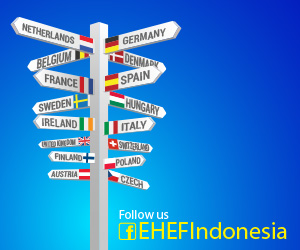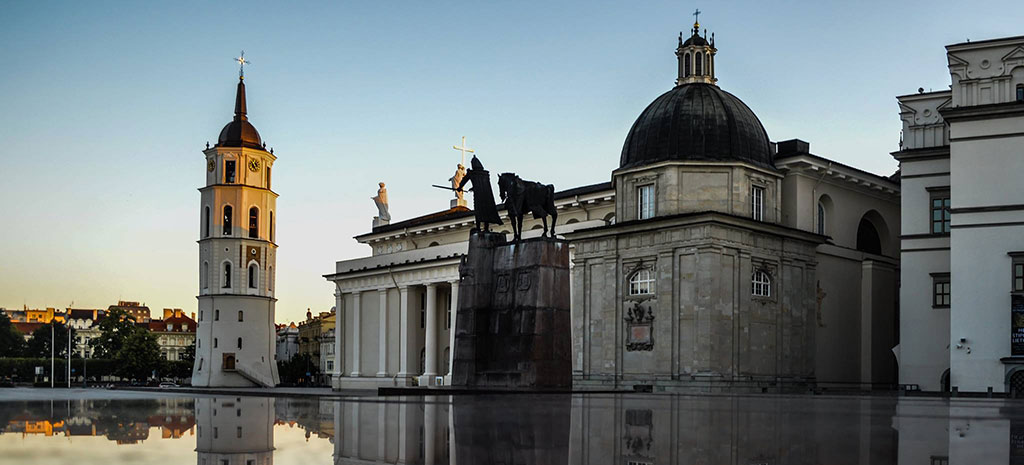
Study in Lithuania
Last edited on 04 Mar 2026
Welcome to Lithuania!
Located in the north of Europe on the Baltic Sea, Lithuania offers a unique blend of multicultural influences, with a complex past and modern, cosmopolitan student cities. Throughout its complicated history has developed a unique culture, which encompasses both deep respect for traditions and robust wish to learn and innovate. Lithuanian people are simple, calm and can be somewhat shy with foreigners, but friendly and good-intended when you get to know them.
It is home to one of the fastest-growing economies in the European Union, Lithuania offers lower living costs than many Western European countries, and its people are some of the most bilingual and well-educated in Europe. It’s also *relatively* mild, despite its northern location, and an ideal choice for nature-lovers, with a lush mix of forests, gently rolling hills, rivers, streams and lakes.
Higher Education System
The academic year starts in September and ends in mid-June and is divided into two semesters – spring and autumn. Students can opt to study full-time or part-time.
Each study programme is evaluated according to the European Credit Transfer System (ECTS), with each year of study being awarded 60 ECTS credits.
Non-university studies are undergraduate studies and they come under what we call the first cycle.
University degrees are offered in three cycles: the first cycle is undergraduate (Bachelor), the second cycle is graduate (Master, and/or specialised professional studies), and the third one is postgraduate (Doctoral; residency; postgraduate in the Arts).
During the first cycle, you can choose to study for a Bachelor’s degree and/or a professional qualification for which you will need to have obtained 180 – 240 ECTS. When you successfully complete the course, with or without a professional qualification you receive a Bachelor’s Diploma. If you only want to study for the professional qualification, then you will receive a Higher Educational Diploma.
Bachelor degrees and professional qualifications are offered at universities; professional qualifications, but not degrees, can be taken at colleges.
If you are at the second cycle stage (or aim to be there) and you want to study for a Master’s degree and/or a specialized professional qualification one of the options open to you is the integrated study programmes. These programmes combine university studies of the first and second cycles. The successful graduates are awarded a Master’s Diploma which testifies to their Master’s degree status. You can also attain a professional qualification. If you are studying for the Master’s Diploma (which is only offered at universities) you have to obtain 90 – 120 ECTS credits.
If you study for the professional qualification at this level you will be awarded a Higher Education Diploma. The purpose of the specialized professional studies at this level is to acquire a qualification in a specific field.
In the third cycle, students study for a postgraduate qualification. This could be for a Doctorate, a Residency (for example, those studying medicine or veterinary science) or a postgraduate qualification in the Arts. Postgraduate studies are offered by a university or a university and science institution collectively. The duration of the different postgraduate studies is determined by the Government.
Some Higher Education institutions organize summer courses in addition to regular courses. These courses, offering mostly academic content, usually last for a couple of weeks in the summer. They are often both formal and informal. In some Higher Education institutions it is possible to gain ECTS credits and scholarships for summer courses (i.e. they are included in the studies).
Student Cities in Lithuania
Vilnius
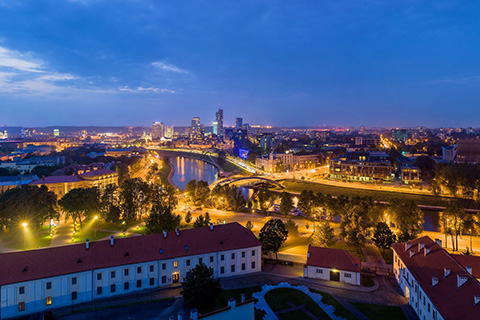
The capital and largest city in Lithuania, Vilnius has a population of around 542,700 people and is located in the southeast of the country. Students who choose a university in Vilnius are bound to be charmed by the city’s famous baroque and gothic architecture, especially in the Old Town (a UNESCO World Heritage Site). Vilnius also offers a vibrant nightlife, some of the highest internet speeds in the world, and pleasantly warm summers. It’s not short of universities, with Vilnius University and Vilnius Gediminas Technical University and Mykolas Romeris University all located here. Vilnius was the European Capital of Culture in 2009 along with the Austrian city of Linz.
Kaunas
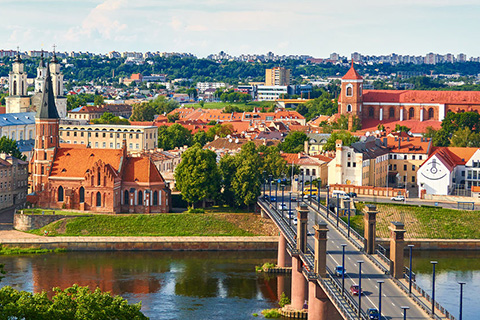
Kaunas is the second-largest city in Lithuania with around 297,700 residents, and is located in the south-central region of the country. The temporary capital of Lithuania during the interwar period, it’s packed with heritage from various eras, with plenty of museums and landmarks such as the 14th century Kaunas Castle. The city has historically been a leading center of Lithuanian cultural, academic and economic life, becoming a major industrial city after World War II. Kaunas is also a university city, with over 35,000 students studying Kaunas University of Technology, Vytautas Magnus University or one of the five other colleges and universities.
Klaipėda
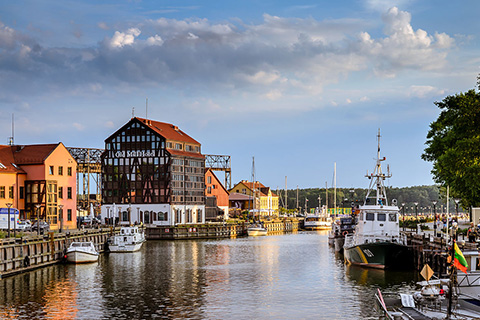
Klaipėda (pronounced klai-pey-da) is located on the Baltic Sea coast at the north-western corner of Lithuania, and has a population of just over 154,000. The city is very much a mix of old and new, with an interesting history that includes a period as a temporary Prussian capital during the Napoleonic wars, and a time when it was known as Memel under German rule. It now serves as the country’s only sea port for large cruise ships and an important gateway in the Curonian Spit, and is close to popular seaside resort towns Nida and Palanga.
Application, Fees and Visas in Lithuania
Admission requirements Applications
Before applying to study in Lithuania, you’ll need to make sure your qualifications will be accepted for your level of study. You’ll need a school leaving certificate (or equivalent) if applying for first cycle (bachelor’s) degrees, a bachelor’s degree or equivalent for second cycle (master’s) programs and a master’s degree if applying for a third cycle (PhD) program. As a foreign citizen, your education documents will need to be evaluated and recognized by the Lithuanian Centre for Quality Assessment in Higher Education (CQAHE), for which you’ll need to submit original copies of your diploma and academic transcript.
Another thing to consider is what language you’ll study in. More than 380 English-taught courses are listed on the program search tool provided by the Study in Lithuania website, including 99 university bachelor’s degrees, 139 master’s degrees and 16 doctoral programs. If you want to study in English and are not a native speaker, you will need to take a proficiency test such as IELTS or TOEFL. Likewise, if you’re studying in Lithuanian, you’ll need to pass a proficiency test in the language.
How to apply to study in Lithuania Hill of Crosses
Lithuanian nationals, people of Lithuanian origin and students from the EU/EEA are eligible to apply through the Lithuanian Higher Education Institutions (LAMA BPO) for state-funded places at universities in Lithuania, which should be done between 1 June and 23 July.
If you’re from a country outside of the EU/EEA, you will need to apply directly to your chosen university, submitting all the required documents:
- Completed application form
- Certificate of education (which has been recognized by the Centre for Quality Assessment in Higher Education)
- CV and letter of motivation
- Copy of your passport, certified by a Commissioner of Oaths
- Photographs of yourself
- A receipt proving that the application and tuition fees have been paid
- Bank statements proving that you are able to cover your tuition fees and living costs while studying in Lithuania
Tuition fees
Tuition fees in Lithuania vary between universities, study levels and programs. Average rates are:
€1,000-5,300 (~US$1,060-5,620) for bachelor’s degrees
€2,200-6,500 (~US$2,330-6,890) for master’s degrees
€7,100-8,500 (~US$7,520-9,000) for PhDs
Living costs
Lithuania is a fairly inexpensive country to live in, with Vilnius University estimating costs of €489 (~US$520) per month, or €5,868 (~US$6,240) per year including accommodation, which in student dormitories can be as little as €70 (~US$74) per month.
Fast fact
- Borders Latvia, Belarus, Poland and the Russian exclave of Kaliningrad Oblast.
- Capital and largest city: Vilnius
- Former Soviet Union state; Lithuania was the first Soviet republic to declare itself independent (in March 1990).
- Official language is Lithuanian; the most common foreign languages are Latvian, Russian, Polish, English and Belarusian.
- Celebrates Independence Day on 16th February (a national holiday).
- Population of around 2.85 million (2016 estimate)
- Largest and most southerly of the three Baltic states
- Currency: Euro (€)
- A member of the European Union, NATO, the Schengen Agreement and the Council of Europe.
- Official name: Lietuvos Respublika (the Republic of Lithuania)
- Government is a unitary semi-presidential republic with both a president and a prime minister.
- The Lithuanian language is one of the oldest-surviving Indo-European languages, and is similar to the ancient Indian language of Sanskrit.
- Main religion is Roman Catholicism.
- Lithuania is the only country with its own official scent (the appropriately named Scent of Lithuania).
- Basketball is the national sport of Lithuania.
- There are five national parks in Lithuania and around a third of the land is forests.
- Ranked first in the world for the number of hot air balloons per resident.
- Labas is the typical Lithuanian greeting.





